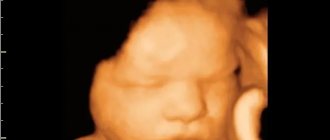If the child doesn't move much
The baby does not move in the mother’s belly until a certain period, after which its movements are considered one of the most significant factors indicating good health of the fetus or, conversely, problems. For what reason does the child move little and should I worry about this? Let's look at these questions.
Women notice the first movements of the fetus only in the middle of pregnancy. Yes, the fetus begins to move much earlier, but it is so small, therefore, its touches to the walls of the uterus are so weightless that the mother does not feel them. It is not uncommon for a child to not move at 18 weeks, even at a time when his weight is about 200 grams, which is quite a lot. Usually at this time the baby is felt by women who already have their own children, that is, they can easily and accurately understand when the baby makes itself known with light tapping. Even the question of why the baby does not move at 19 weeks should not worry first-time mothers, since they, as a rule, feel the baby’s movements exactly in the middle of the period - at 20 weeks.
You need to worry if the baby does not move in the stomach for 2 days, while the period is already more than 20-22 weeks. Moreover, even a day of absence of fetal movements can be a very dangerous symptom - a sign of an acute lack of oxygen. And if the child does not move all day, and you are unable to provoke his movements in the uterus, it makes sense to urgently consult a doctor. If it’s daytime, you can go to an unscheduled consultation with your doctor. If it’s night outside, but you’re very worried, go to the maternity hospital. At a minimum, you will be able to listen to the baby's heartbeat using an obstetric stethoscope. And the next day, if everything is more or less in order, they will send you for an ultrasound (Doppler ultrasound) or CTG.
Another reason why the baby does not move all day is that the birth is imminent. The child usually becomes quiet in front of them. And the main reason for this lull is its large size. Now the mother feels not the movement of the child in the uterus, but the protrusion of his limbs. A baby can even hurt his mother if he rests his feet on her ribs.
And yet, how often should a child move in the mother’s womb, what do the doctors themselves say about this? The generally accepted opinion is that at least 10 times a day. If there are fewer movements, and the pregnancy is significantly past the middle, it makes sense to consult a doctor. Only he can dispel your doubts.
Can the style of fetal movements indicate the future character of the child?
Studies were conducted to identify the relationship between the nature and frequency of fetal movements and the temperament of a child from one to two years of age. There is reason to believe that based on the movements of the baby in the womb, one can draw conclusions about how impulsive he will be or, on the contrary, how controlled he will be, how active or calm he will be in general. Similar studies were conducted at the private research university Johnson Hopkins in the USA. Physician and psychologist Jane DiPietro studied the behavior of the fetus, the development of its sensations and reactions. According to her, the connection between the prenatal period and the character of the child after birth is obvious and many reactions are laid down even before birth.
Pregnancy is a happy time of anticipation. And when your baby’s pushes and touches appear in it, this is another reason to rejoice.
Why does the child move a lot?
The baby pushes hard in the stomach - many women worry about this during pregnancy. But no less than expectant mothers, who, on the contrary, are frightened by the lack of movement in the womb. Both are interested in how a child should move normally? But every pregnant woman’s body is individual, and outside advice is not always applicable to a particular situation.
Usually the first movements are felt between 18 and 22 weeks. Hardly perceptible movements are eventually replaced by active, strong tremors. Why does the baby move unusually in the womb? The intensity of movements is influenced by several factors.
1. Gestational age.
As the term increases, the baby grows, grows stronger and becomes stronger. This is why light tremors turn into very sensitive “kicks” over long periods of time. From 24 to 32 weeks is a period of rapid growth of the child, it is at this time that the movement inside is especially noticeable. The number of movements decreases by the time of birth, but the strength does not stop growing.
2. Nutrition.
If the child is actively moving, then he may not have enough oxygen or nutrition. Relative signs of this can be seen on ultrasound. This is premature maturation of the placenta, for example.
3. External factors.
The baby’s intense reaction occurs to external influences. Examples of external stimuli can be: the voice of dad or mom, loud music, sound in the subway, a car horn, or just someone’s hand on the child’s “house.”
4. Mode.
The baby's wakefulness in the mother's belly does not always occur; he has an individual regime. Sleep takes up most of his time; on average, he sleeps for 3 hours, followed by a short break. The strength of the kicks is influenced by the baby's temperament or mood.
5. Mom's emotions.
An active reaction to the mother’s mood begins around the 25th week of pregnancy. A bad mood often causes active movements of the child, but some children, on the contrary, calm down and wait for the “atmosphere” to change. Staying in one position for a long time, for example, at the computer, can provoke the baby to move, which will sound like a call to change occupation; the so-called request to move is a common reason why a child pushes hard in the mother’s stomach.
Certain moments require vigilance. Starting from week 25, the baby should move about 10 times per hour. But he may not move at all for 3 hours, as this is the normal time for continuous sleep. If the fetus moves regularly, the mother should not worry. The reason to be wary is if the child pushes hard in the stomach for a long time, without breaks. This may portend hypoxia - lack of oxygen. Acute oxygen deficiency can be diagnosed by a doctor by listening to the fetal heart sounds, as well as by prescribing a special ultrasound. The main task in case of hypoxia is to improve the baby’s nutrition. Hospitalization may be required. But don't worry ahead of time. Many mothers are hypervigilant and panic with or without reason. If the fetus is passive, it is recommended to eat something sweet and do exercises. If the baby answered, everything is fine, otherwise you should repeat the same thing after 2-3 hours, perhaps he is just sleeping.
Calmness and a positive attitude are the key to the health of mother and baby in any period of life and development.
For future parents, the first movements of the fetus in the womb are of great importance. They are first detected in the middle of pregnancy.
During the first pregnancy, the baby’s movements begin to be felt later than in the second and subsequent times. Sometimes women who have not yet given birth confuse this phenomenon with muscle spasms, gas formation, etc. Why does this happen? The abdominal wall stretches and becomes more sensitive.
Why did the fetus stop moving in the stomach?
The baby has stopped moving - this is a very exciting situation for the expectant mother. Does he have enough, does he feel good, is he comfortable?
At the first stage of bearing a baby, you can only find out about this through tests and ultrasound. But from 18-25 weeks, the woman begins to feel the movements of her baby in the womb. Some experience this joy a couple of weeks earlier. From now on, you can monitor your baby’s well-being using these extraordinary signals.
Doctors usually indicate the need to count the number of movements during the day, starting from 24-25 weeks. At this stage, the fetus should normally be active at least 10 times a day. Before this period, movements are simply unnoticeable to the mother. And after 36 weeks, the baby becomes too cramped in the womb for frequent body movements. But their strength increases
Monitoring fetal movements is very important. After all, this is the main indicator of his condition, which is constantly available to a pregnant woman.
And why the fetus has stopped moving in the stomach, you should definitely ask your doctor, and without delay, if such calmness lasts 12 hours or more. Intrauterine death is the worst thing that can cause a lack of fetal activity.
The intensity of movements depends on several factors. The greatest activity of the baby can be felt when in certain positions - lying on his back or crossing his legs. That is, in those in which the supply of oxygen through the blood to the child’s place slows down. The baby massages the placenta, accelerating blood flow. These body movements are felt. The “bellies” also behave restlessly when the mother is in a stuffy room. Or when sitting indoors for a long time.
Your baby may react to certain foods. So, sour lemon and sweets can provoke a series of body movements. In addition, an unborn little person already has his own temperament and develops a certain daily routine. Most often during the day, when the mother is active, the child is rocked to sleep by her movements and sleeps for 3-4 hours with short breaks. Mom’s emotions are also a reason to show her position. External stimuli, such as loud sounds and bright lights, will certainly cause a reaction from the little man.
Thus, the child usually does not move in a state of sleep or simply at rest. This may indicate that he is happy with everything and feels good in the womb. Among other things, this may be a sign of fetal distress. Do not feel embarrassed under any circumstances and call an ambulance if you realize that there are no or very few movements during non-working hours. The specialist will listen to the child’s heart or prescribe an extraordinary ultrasound or CTG examination. Timely measures taken will protect you from sad consequences. This is the case when it is better to play it safe so that the pregnancy ends well.
Evolution of sensations in the stomach of an expectant mother
As pregnancy progresses and the fetus develops, the nature and frequency of movements change accordingly. This must be monitored in order to consult a doctor in time if alarming signs are detected. It is necessary to inform the specialist when the baby began to move and how actively he does it.
In the middle of the second trimester, pregnant women begin to really feel the baby's movements (however, he makes chaotic movements already from the 3rd month). Some describe the sensation as butterflies in the stomach. As the fetus develops, it moves more and more actively, and by the 22nd week all pregnant women should feel this (see also: how often should a baby move at the 23rd week of pregnancy?).
The child does not just move chaotically all day, he performs various actions. During an ultrasound examination, they notice how the fetus swallows liquid, rotates its head, twists its arms, touches the umbilical cord, etc. If the child turns over, a change in the shape of the abdomen is observed.
Closer to childbirth, the tremors are felt more on the right side if the baby is positioned upside down. They often cause discomfort, and to avoid it, you can lean forward or lie on your side. Also, in later stages, the head or buttocks are fixed at the entrance to the pelvis, the fetus moves less, because it is cramped. However, some babies begin to push harder.
At what time can you feel fetal movement?
The first movement of a future baby is always an exciting event. Every mother has her own story about how this happened. And it makes no difference which child is the first or the third, it is always an event.
It is possible to record fetal movements in the womb quite early:
- 5-6 weeks – heartbeat can be detected;
- 8 weeks – the nervous system is already formed, the first motor reflexes appear;
- 9 weeks – arms and legs can bend;
- 10 weeks - can change movement on its own (for example, if it bumps into the wall of the uterus);
- 13-14 weeks – the baby is already putting his fingers in his mouth;
- 15-16 weeks – arms, legs, wrists and feet can already move, the fetus makes movements with its head and mouth;
- 17-18 weeks - eye movements begin, the baby can suck his finger and cross his legs, at this time the first movement that the mother feels most often occurs;
- from the 19th-20th week onwards the baby becomes larger and more active; at later stages you can not only feel, but also see its movements and movements in the mother’s belly.
So, the period of the first movement is from the 16th to the 24th week.
The timing of this event may vary. This depends on many reasons:
- what kind of pregnancy is it: in the first pregnancy, movement can be felt later - at the 20th week, in the second - around the 18th week, and subsequent ones - a little earlier - at the 15-16th week;
- if the expectant mother is plump, she may feel movement later, if she has a slender physique, she may feel it earlier;
- attachment of the placenta to the front wall - movement will be felt earlier, to the back - a little later;
- time of day - most often movements, especially the first ones, occur in the evening or at night;
- a woman’s sensitivity - some listen to the slightest movement within themselves, others do not get hung up on it;
- The active lifestyle of a pregnant woman, in which she moves a lot and often, can leave the very first movement of the baby unnoticed.
How does the baby move just before birth?
In most cases, movements become less intense. This is due to two factors:
- The fruit is already large, but continues to develop. The uterus can stretch, but it is not dimensionless. Closer to childbirth, the fetus has little space, so it is constrained in its movements. Also, at the end of the gestation period, the uterus descends in such a way that the baby is fixed between the pelvic bones, which further limits it.
- Before birth, the fetus takes on a vertical position when it was previously in a horizontal position - it is upside down in the stomach. Most of the shocks occur in the upper part of the uterus, which is least sensitive.
The fetus retains constant motor activity, but the pregnant woman experiences completely different sensations in the second and third trimesters. In the second, the stomach “shakes” and you can see the baby’s foot or hand through the skin. Closer to childbirth, this can no longer be noticed.
Why might a child move little or stop doing so?
It is not always bad when the baby begins to move less or does not show physical activity at all. This may be due to physiological reasons. In other cases, it is worth thinking about the abnormal course of pregnancy. One way or another, when the fetus stops pushing, you need to consult a doctor for advice.
Physiological reasons
If movements are not felt for more than 3 hours, you should try to rouse the baby - for example, eat sweets or drink sweet tea, lie on your left side for about an hour, take a walk, walk up the stairs. The child must respond to such actions.
As a rule, towards the end of pregnancy, a woman recognizes the baby’s sleep and wakefulness cycles, knows all his habits and preferences, so she is not particularly worried when he calms down. Excessive concern for movements in the abdomen, as well as an absolute lack of attention to this phenomenon, is not welcome.
Causes for concern
Sometimes the fetus does not move or moves less actively as a result of lack of oxygen. This can be indicated by the baby's calmness during the day, when the mother is awake and knows that he is usually awake at this time. In this case, you need to consult a doctor. If it is not possible to see a gynecologist right away, you should call an ambulance.
Doctors will use a special device to listen to the fetal heartbeat, which is normally 120–160 beats per minute. If the overall indicators are normal, a cardiotocographic study is performed to evaluate the contractions of the baby’s heart, its general condition and identify hypoxia.
This examination takes about half an hour. If no motor reaction was detected during the test, the pregnant woman is asked to move actively, then the study is repeated.
If hypoxia is confirmed, treatment is prescribed, which depends on the severity of the pathology. In case of minor deviations, the pregnancy is constantly monitored, and various examinations are periodically carried out. If the symptoms of hypoxia are pronounced, urgent delivery is necessary. Depending on the condition of the pregnant woman, they resort to caesarean section or induction of labor.
Why does a baby even move in the womb?
The reasons why a baby begins to move actively can be different:
- if the mother is in motion, the baby is not too active, he is lulled by rocking (exception - the uncomfortable position of the mother’s body can provoke the child’s indignant activity);
- The child is especially active during moments of rest and sleep of the expectant mother;
- the mother's hunger immediately affects the activity of the fetus - it begins to signal the need to eat with movement;
- any stress, especially loud sounds, can either make the child freeze or actively move;
- uncomfortable position - for example, lying on your back in late pregnancy can provoke active movement of the baby.
Photo source: shutterstock.com
Attention! Lack of oxygen caused by smoking (whether active or passive), being in an unventilated and stuffy room, tight and uncomfortable clothing can lead to fetal hypoxia. The child begins to move and push vigorously.
How many tremors can there be during the day?
The norm is 10-15 recorded movements per hour.
The intensity of movements is affected by the time of day - you need to remember that the child also sleeps, so he may not be heard for 3-4 hours. In total, the baby sleeps or dozes 15-17 hours a day with short breaks for wakefulness. On average, rest time does not exceed an hour.
But the determining factor when calculating movements will be the gestational age:
- at the 20th week – up to 200 movements per day;
- at 26-32 weeks – up to 600 per day;
- from the 32nd week onwards the number of movements decreases, since the baby is already cramped in the stomach and cannot move so quickly.
How to properly check movements at home?
Every expectant mother needs to count how often the fetus moves during the day. It is recommended to pay special attention to this in the third trimester. During daylight hours, the child should move at least 10 times.
There are tests to help check your baby's activity at home. It is recommended to get a card, which you can take from a doctor or create yourself. Every day it records all the baby’s movements over a certain period of time.
The next method is called the “Sadowski technique”. After dinner, the pregnant woman needs to lie on her left side and count the number of movements, taking into account even subtle ones. In an hour, the fetus should move 10 times; if the number of movements is less, you need to count them for another hour. You should be concerned if in the evening after eating the child moves less than 10 times in 2 hours.
Duration 30 weeks. The baby moves actively every day, sometimes he kicks so hard that it becomes difficult to breathe. And today the baby in my stomach doesn’t move all day! Last week I had an ultrasound and they said everything was fine. Very worried. Is this normal or should I immediately go to the doctor?
Similar articles:
We also had such a case. My wife didn't feel it all day. We woke up in the middle of the night and went to the hospital. Listen to the heart beat. The doctor said it was normal. Considering that my wife had been visiting guests in the morning and eating like crazy.
In that case, I would go to the doctor. At a minimum, to listen to the heartbeat. Although you can listen to it yourself if you have a regular listening device. which doctors listen to when they cough. You will hear your own heart, but the baby’s heartbeat is different; when you hear it, you will understand.
Remember what you ate and drank the day before. Sometimes it depends on the products we eat. During my pregnancy in the summer, I wanted non-alcoholic beer. Very much. I knew that I shouldn’t, but I couldn’t resist and drank two large sips. Even though it wasn’t in degrees, my daughter didn’t move for a day and a half. I was very scared then. Mom scolded me, but said that she apparently slept off)))
Too much activity is also not good. Everything should be in moderation. Try to take action. The most effective way to reach him. Apply a piece of ice to your stomach for a couple of seconds. The baby will definitely react. But if there is silence, then put your feet up and run to the hospital.
In general, my child rarely moved during the day. But at night, he probably played football there. I couldn't sleep at night. And I never thought about the fact that he doesn’t move during the day. I think there's nothing wrong. If yesterday you were active in the womb, but today you are calm. It's too early to panic. Perhaps he moved at night, but less actively. But you were asleep, so you didn’t feel it.
30 weeks is not the last few weeks. During this period, I was actively kicked, especially if I was sitting somehow uncomfortable for the baby or if I didn’t sleep late at night. And when everything is normal, then there is silence... Maybe you just don’t agree with the circadian rhythms? It’s good that everything was normal on the ultrasound, but this is not a reason to let down your guard. I would still go to the doctor. Better to play it safe. Let them listen - if everything is fine, then there is nothing to worry about.
my belly was also dying in recent weeks, I was also nervous about it. my gynecologist said that this happens, and that there is no need to be nervous about it, so as not to scare the child. In general, he just sleeps, they are very calmed by our monotonous affairs, and by nightfall, he will start walking, just look. Take care of your nerves mommy)))
First you need to take measures so that the child moves. Try to eat something very sweet or drink a glass of very cold water, the internal body temperature will change and the child will have to make some movements. If two hours after this there are no movements, then it is better to immediately contact a gynecologist.
Movements in the abdomen are familiar to many women who have been pregnant at least once. But sometimes people who are not pregnant experience these symptoms. So the question arises, what could be moving in the lower abdomen?
The feeling that something is moving in the stomach is familiar to many people. The reasons may be hidden in various processes: bloating, internal movements, mobility of muscle structures, strange sounds without pain.
How to wake up your baby to feel him move?
- To “wake up” the baby, the best thing you can do is lie on your left side and drink some orange juice (of course, if there are no allergic reactions) or eat something sweet, and then wait 30 minutes. Thanks to the sugar feeding and immobility of the expectant mother the child will begin to be active.
- You can provoke a response from the baby by gently stroking your belly with your hand.
- To feel the movement or kick, you can move your stomach with your hands in one direction or another.
- You can have a little snack.
- One of the unusual ways to influence the activity of a child is to drink a glass of very cold water, the temperature inside will change and this will affect the baby and push him to perform some action.
- You can also move a little, but you should not choose monotonous movements, otherwise it will lead to the opposite effect and the baby will be lulled to sleep.
If none of the above helps, then you need to call a gynecologist for advice. The main thing is not to panic, because stress will negatively affect both your own condition and the condition of the child.
It is important to remember that all the emotions that a pregnant woman experiences are also experienced by the baby. After visiting a doctor, there is a chance that a pregnant woman will make an appointment, during which she will be connected to a fetal monitor to monitor the fetal heartbeat and track its movements.
If abnormalities are detected, doctors always have an ultrasound machine on hand and will be able to quickly take a look at the child and check how he feels there.
During pregnancy, you should adhere to the golden rule: you need to listen to your inner voice. Anxiety is a part of being a parent, and it makes sense that it would arise during pregnancy.
A woman should listen carefully to her body and monitor her baby's activity schedule. The task of the doctor who is managing the pregnancy is to help the pregnant woman, so it is better to be overly suspicious and play it safe than to sit back and think that everything will be fine and do nothing.
Gestation period
Most often, movement in the lower abdomen occurs in women of reproductive age. The cause of this phenomenon is pregnancy. Most people are familiar with those feelings when the unborn baby makes itself felt by pushing against the walls of the uterine cavity.
The first time the fetus begins to move is when it is three to five weeks old. This is due to the fact that the hearts of the unborn baby have already begun to beat. Unfortunately, at this moment the pregnant woman still feels nothing, because the size of the fetus is very small.
The first movements appear around 12-20 weeks. It all depends on how the fetus is positioned relative to the uterus, what kind of pregnancy it is and what the physique of the expectant mother is.
Doctors have found that the child’s movements depend on several factors:
- Fetal activity increases in the evening.
- The movements directly depend on the mother’s mood. If a woman is afraid or cries, the baby will behave quietly.
- The child becomes calmer when a woman engages in physical activity. It's better to rest more often.
- After eating, the motor activity of the fetus increases.
- Environmental sounds affect fetal movement. If something scares him or calm music is playing, the baby will be quiet.
- The child begins to move actively if the mother takes an uncomfortable position.
As the child grows, movements become conscious. But if the baby is sleeping, then he stops moving for a while.
Fetal movement - how it occurs normally
With the exception of three to four hours a day when the child sleeps, he is in constant motion. In the twentieth week, the fetus makes two hundred movements per day, from the twenty-eighth to the thirty-second their number increases to six hundred. Then, activity decreases again.
Fetal motor activity may vary depending on the following factors:
- Times of Day . Usually the fetus moves more actively in the evening and at night.
- Mother's emotions . If a pregnant woman is under stress, the child gets scared, may freeze and stop moving or, conversely, react to adrenaline with active movements.
- Physical activity . During physical activity, the child is usually calmer than at rest. If the mother is in an uncomfortable position for a long time, the fetus may react with strong painful tremors.
- Pregnant woman's diet . If the mother feels hungry, the baby begins to move more actively. Also, the pushing and touching becomes stronger after eating. Especially if mom eats sweets.
- Environment . The fetus reacts to loud sounds and sudden switching on of light. He may freeze in fear or, conversely, begin to move more actively.
Peristalsis of the intestinal tract
Why do abdominal movements occur without pregnancy? Perhaps the reason lies in the active peristalsis of the digestive tract. In order for food to move, the intestines must make wave-like contractions. This process is technically called peristalsis.
The sensation of movement can occur on any side: right, left, lower and upper abdomen. This is due to the fact that the digestive tract is long. It ranges from 10 centimeters to 10 meters.
The activity of the digestive system depends on the diet, the state of human health, and the characteristics of the nervous system. If a person is completely healthy, then peristalsis does not cause any discomfort.
Parasitic infection in the stomach
Why is there something moving in my stomach? Movements in the left side of the abdomen can be explained by the presence of parasites in the body. Many patients deny this fact, because it is generally accepted that worms are diseases of unscrupulous people.
But there is nothing wrong with this, because helminths can enter the body not only through dirty hands, but also through poorly washed vegetables and fruits, unprocessed meat, or while picking in the soil or sand when planting in the country.
In this case, the person will not only complain that something is moving in the stomach, but also other symptoms:
- nausea, periodic vomiting;
- diarrhea and constipation;
- abdominal pain;
- increased or, conversely, lack of appetite;
- temperature increase.
If there is a feeling of movement in the intestines, then you need to visit a doctor as soon as possible and get tested. There is no need to be afraid if the diagnosis is confirmed. The patient will be prescribed a course of drug therapy and a strict diet.
Increased gas formation in the stomach
If there is movement in the abdomen, but not pregnancy, then increased gas formation may be the cause. Any process of digestion of food is accompanied by the release of gases. Increased gas formation, according to statistics, affects more than 40 percent of people.
Under normal conditions, there are about 200 milliliters of gases in the digestive tract. But the discharge is observed to be no less than 600 milliliters.
With increased release of gases, swelling of the intestinal tract, bloating, rumbling, and pain are observed. The causes of the pathological process are ingestion of large amounts of air, disruption of the microflora of the intestinal tract, disruption of enzyme function, and consumption of gas-forming products.
Abdominal masses
Why does my stomach feel like it's moving? One of the unpleasant reasons is the formation of a tumor, which gradually begins to grow. In the absence of timely treatment, the patient will begin to complain of pain, nausea, vomiting, discomfort, and abdominal enlargement.
Adhesions, tumors in the intestines, stomach or liver, and polyps pose a significant danger to humans. To confirm the diagnosis, it is necessary to undergo an examination, which consists of radiography with contrast and ultrasound diagnostics.
Reduction of organs
The uterine cavity in women can move inside the abdomen. This process is most often observed during menstruation, when the uterus actively contracts to push out the excess layer of endometrium.
This process does not require treatment. But if movement is accompanied by spasm, then you can take a painkiller or antispasmodic.
Very often, contractions are observed at night, when a person is at rest. This process should not cause concern if it is not accompanied by pain.
Many people at a doctor's appointment complain that something is moving in their side. Some even worry that parasites have settled in their body. But in some cases the diagnosis is not confirmed, and the whole reason lies in nervous tension. To get rid of this feeling, the patient is prescribed sedatives. If the pathology is nevertheless confirmed, then drug therapy, a strict diet, an active lifestyle and giving up bad habits are prescribed.










